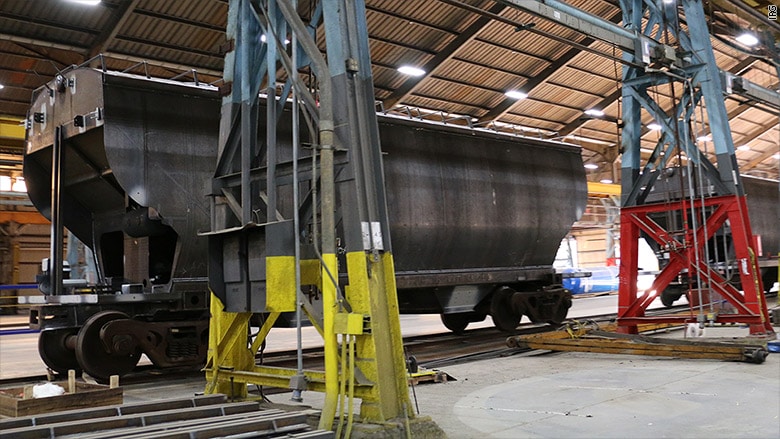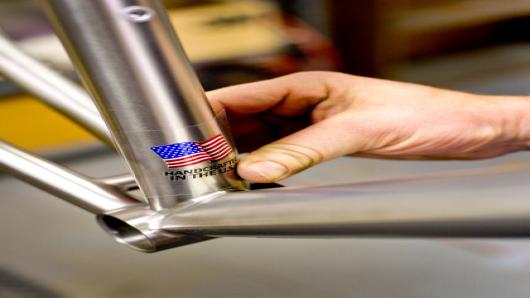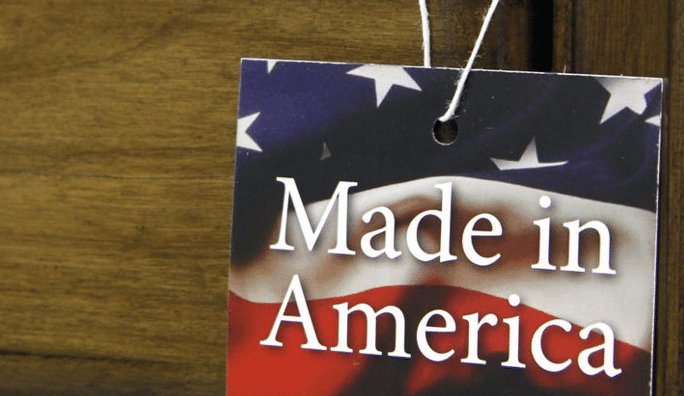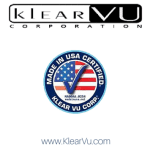Does Walmart’s Patriotic PR Have Legs?
Walmart made a little bit of news on Tuesday. Right after the world’s largest retailer committed to fast-tracking the hiring of more military veterans, it announced plans to source an additional $50 billion worth of American-made goods over the next decade.
Wow. That’s a very patriotic start to the week for the company that Mr. Sam built.
These announcements brought praise from all corners: First Lady Michelle Obama, veterans groups, even yours truly. And that’s because Walmart’s domestic procurement plans are undeniably big news for the American manufacturing sector. This company creates a huge wake. It’s the nation’s largest employer, with 1.4 million workers across the country. It does an unbelievable amount of business; it’s larger than K-Mart, Target, Sears, CostCo, Home Depot, and Kroger combined. And consider that if it were its own country — the Republic of Walmart, for instance — its sales would immediately rank it among the top 25 economies in the world.
Given the sheer size of its footprint, there isn’t another company out there that drives retail trends like Walmart does. And it goes without saying that I have high hopes that not only will it follow through with its procurement plans but that its competitors will learn from its example.
But it’s also worth noting that Walmart’s move is not altogether altruistic.
While $50 billion worth of American-made goods over the next decade is nothing to sneeze at, it’s a relative drop in the bucket to a company of this size. Walmart annually increases its global procurement costs by about $21 billion, making you wonder how much $5 billion a year accounts for in a multibillion-dollar business strategy.
What’s more, the company registered approximately $444 billion in total sales in 2012 — with the vast majority of the products that it sells coming from overseas factories, many in China. Despite Walmart’s oft-repeated statistic that two-thirds of its procurement spending is on American-made goods, most of that comes in the form of low-cost grocery and paper products.
The higher-ticket items like appliances and apparel continue to come from overseas, where unregulated subcontractors keep costs low by any means necessary. In fact, economists have calculated that Chinese exports to Walmart alone accounted for 11 percent of America’s trade deficit with that country between 2001 and 2006. What’s more, it’s no small irony that the company is responsible for hundreds of thousands of manufacturing jobs going overseas. Despite festooning its stores with a “made in America” motif in the 1980s, Walmart, in its demand for low prices, was still essentially forcing suppliers to move offshore. And they did, in droves. Today, 80 percent of the company’s suppliers are based in China.
Although its announcements this week are draped in red, white, and blue bunting, remember that there are no dummies at corporate HQ in Bentonville, Arkansas. The retail giant clearly understands good politics; American-made products continue to increase in popularity, as shown in a July 2012 opinion poll, and consumers are clamoring for more Buy-American options. And the November elections further bore this trend out — the American factory floor was the most ubiquitous image in political advertising during the campaign cycle.
Like any smart company, Walmart is simply responding to its customers’ desires. But make no mistake; it makes economic sense to do so. With energy and transportation costs low in the United States, doing business stateside is more and more lucrative — hence the boomlet of job reshoring that has companies like Apple announcing plans to bring some manufacturing back to plants in the States.
So with all of this in mind, what’s the takeaway?
First: Walmart’s plans are certainly welcome news. It comes with plenty of caveats and certainly smells like a publicity stunt, but an increase in domestic procurement by the world’s largest retailer will hopefully set a new standard for its competitors to follow.
Second: The growing demand for American-made products can be heard in even the loftiest corporate offices. Opinion matters, and Walmart clearly listened.
So now, will they follow through? Let’s watch and see.
Follow Scott Paul on Twitter: www.twitter.com/ScottPaulAAM
SOURCE: Huffington Post









Leave a Reply
Want to join the discussion?Feel free to contribute!